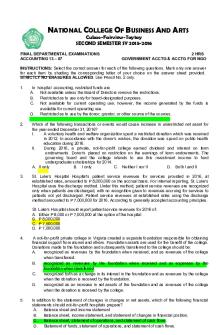SDX Alliance is a large company that sells computers PDF

| Title | SDX Alliance is a large company that sells computers |
|---|---|
| Author | Viviane Ouellet |
| Course | Ethics |
| Institution | St. Lawrence College |
| Pages | 4 |
| File Size | 68.2 KB |
| File Type | |
| Total Downloads | 76 |
| Total Views | 138 |
Summary
Prep d'exam de mi-session...
Description
SDX Alliance is a large company that sells computers, computer components, and software. Ralph is hired as an entry-level software engineer at SDX Alliance. His first project was to assist in writing the code for SDX Alliance’s new hard disc controller. He had previously worked on a similar system interning at a start-up and had written a code which greatly enhanced the performance of their product. Ralph quietly re-uses this same code in the SDX Alliance product, and does not think to tell anyone that he has used the code from his last job. His manager is thrilled with the speed improvements this code brings to the product. Before the product is released, it has to undergo a four-month long quality assurance process review. During the review of the product, it was found the code which Ralph developed had been copyrighted by the startup he had previously worked for. Even though Ralph had developed the code, his previous company still owned the intellectual property rights to it. When his manager informed Ralph of the problem, Ralph admits he did not realize he had made a mistake because he was not familiar with copyright laws. Ralph then goes on to explain that the start-up he used to work for is now out of business and is unsure if SDX Alliance would be able to get in contact with the owner of the copyright. If SDX Alliance can’t use Ralph’s code, then it will have to rewrite the entire code of the product, delaying its release by many months. What should they do?
Patrick Seniuk Best Professor ever 345-BNR- Sect. 34515 April 30, 2021
1) There are multiple facts associated with this case. SDX Alliance, a company that sells, amongst other things, computer software, hired an entry-level software engineer named Ralph. His first project is to write computer code for a similar product that he worked on at his previous company, which has subsequently gone out of business. The computer coding which Ralph worked on at his previous employer was copyrighted, however, without telling anyone, Ralph used the copyrighted code in his newly assigned project. Ralph’s boss praises him for the speed with which he completed the coding project. But before the product roll out, while undergoing quality assurance, it is discovered that the code had been copyrighted by another business. Ralph claims that he did not think what he did was wrong, while the boss is concerned by the prospect of having to redesign the code, a task that could take over four months. Finally, it appears that attempts to track down the former business owner with rights to the code given that the company no longer exists.
2) There are several relevant facts of the case. First, a new employee at SDX Alliance has used a copyright computer code from a previous employer. Second, the employee, though he created the code, did not disclose to his new employer that the code was under copyright. The third point is that, if SDX is unable to acquire the rights to the computer code from the previous company,
2
they must discard the entire product and begin again, which could require over four months to recreate the product. The final relevant fact is that the company with ownership rights to the code is no longer in business, making it potentially very difficult to track down the former company owner. There are likewise several groups with interests at stake. SDX has considerable financial interest in this issue. If forced to redesign the computer code, not only would SDX resources have been wasted during the initial coding, but also in the subsequent months of redevelopment. The programmer has an interest in so far as his work could end up resulting in more work for SDX. Also, if forced to redesign the code, his job could be in jeopardy due to his mistake. The boss also has a considerable stake in the issue, since it appears that he will be the one who must decide how to proceed. Last, the original copyright holder has a stake in the issue. If SDX uses the righted code, they will be effectively stealing intellectual property. However, since the company has gone out of business, it’s not clear what they would be owed, if anything.
3) In this situation, I argue that the best course of action is that the company resign the computer code. By adopting a Kantian approach to the dilemma, it would be unethical to use the copyrighted code. First, if SDX uses the copyrighted code, they would be denying the former business owner royalties, as well as proper recognition of intellectual property rights. Likewise, to use the code would be to use the former business owner as a means to an end rather than an end-in-itself. It seems highly probable that the former business owner would not agree to the use of the code, meaning that he would be used in a deceptive scheme that he would not agree to.
3
But more importantly, if SDX elects to use the copyrighted code, it would fail to align with the categorical imperative. By choosing to use the code, SDX would in effect be universalizing a maxim to use copyrighted code without proper authorization. As a consequence, this maxim would mean that other companies should also us copyrighted code without permission, and this puts SDX at risk of having their own intellectual property being used without permission. The best way to act would be to rewrite the code from the beginning. This would employ a maxim that espouses that we should never use copyrighted material without permission, since it is deceptive, and no person could in principle agree with this scheme, since they too would be at risk of having copyrighted material taken without consent.
4...
Similar Free PDFs
Popular Institutions
- Tinajero National High School - Annex
- Politeknik Caltex Riau
- Yokohama City University
- SGT University
- University of Al-Qadisiyah
- Divine Word College of Vigan
- Techniek College Rotterdam
- Universidade de Santiago
- Universiti Teknologi MARA Cawangan Johor Kampus Pasir Gudang
- Poltekkes Kemenkes Yogyakarta
- Baguio City National High School
- Colegio san marcos
- preparatoria uno
- Centro de Bachillerato Tecnológico Industrial y de Servicios No. 107
- Dalian Maritime University
- Quang Trung Secondary School
- Colegio Tecnológico en Informática
- Corporación Regional de Educación Superior
- Grupo CEDVA
- Dar Al Uloom University
- Centro de Estudios Preuniversitarios de la Universidad Nacional de Ingeniería
- 上智大学
- Aakash International School, Nuna Majara
- San Felipe Neri Catholic School
- Kang Chiao International School - New Taipei City
- Misamis Occidental National High School
- Institución Educativa Escuela Normal Juan Ladrilleros
- Kolehiyo ng Pantukan
- Batanes State College
- Instituto Continental
- Sekolah Menengah Kejuruan Kesehatan Kaltara (Tarakan)
- Colegio de La Inmaculada Concepcion - Cebu















